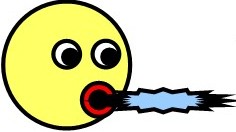First, while I remembered Andropov as the short-lived successor to Brezhnev, I drew a blank on the guy who came after him and before Gorbachev. Well, the internet search engines can find anything, anything at all, that you might want to know about. The Wikipedia entry for the Soviet Union gave me a nice list of the leaders of the Soviet Union. And the winner is: Chernenko! Both Andropov and Chernenko lasted just over a year apiece before dying in office, which had to have been expensive for the CPSU, since they would have had to print up a bunch of new pictures and send them out to all of the party functionaries to put up on their walls.
All of the other vital information about the Soviet Union was on the main Wikipedia page, including a musical link for the national anthem. Alas, my computer doesn't have whatever program plays .ogg files. However, another quick internet search took me to an archived article from radio station WFMU's blog, with a link to a Windows Media video file for the Hymn of the Soviet Union. It even has English subtitles, and the words are oh-so-ironic. "Sing to the Motherland, home of the free," indeed.
Even more interesting was a link to Lev Borodulin's "Rarities of the USSR Photochronicles" page. If you've got the time, look through the galleries at the old black-and-white pictures. Warning: Do not look at this picture! Don't say I didn't warn you! A 1930s-era Soviet bikini (yes, I know there were no bikinis yet at that time) is a very scary sight. And doesn't the fellow who is pointing in the picture over the gallery title "The life grew better and more cheerful" look a lot like Alan Alda?
So do you ever feel nostalgic about the good old days of the Cold War? Things were so much simpler then. It was us vs. the Evil Empire, and while the peaceniks were advocating unilateral disarmament, and mopes like Sting were singing that "there's no such thing as a winnable war, it's a lie we don't believe any more", a funny thing happened: We won. We outspent the Soviets into submission; we could afford guns and butter, they couldn't. The Soviet Union withered away in the way that the capitalist countries were supposed to do when true communism had been achieved. Sort of like what Jackson Browne sang about in "Lawyers in Love" back in 1983:
Last night I watched the news from Washington, the capitol
The Russians escaped while we weren't watching them, like Russians will
Now we've got all this room, we've even got the moon,
And I hear the USSR will be open soon
As vacation land for lawyers in love
Almost prescient. Of course, the Russians themselves and the various peoples in the other successor nations are still there. It was just the Soviet government that had disappeared. It was almost the diametric opposite of a neutron bomb.
After it happened and the strange new world of 1992 appeared, we suddenly realized that we had been pushing hard against something that we hadn't didn't know was there. It was only the abrupt absence of resistance and the lurch we felt when we kept pushing for that one moment, that caused us to understand how hard we had been pushing.
In a post-9/11 world, it seems in retrospect like it was a much less complicated world, and much less dangerous than it seemed at the time. Of course, we know in hindsight that we weren't going to get annihilated by the Soviet nuclear arsenal, that the peaceniks were woefully wrong, that the "99 Red Balloons" alarmists had bet on the wrong horse. Because of the way things turned out, Ronald Reagan is remembered as a visionary, not a dangerous warmonger. It's not often that you get that kind of swift historical judgment.

